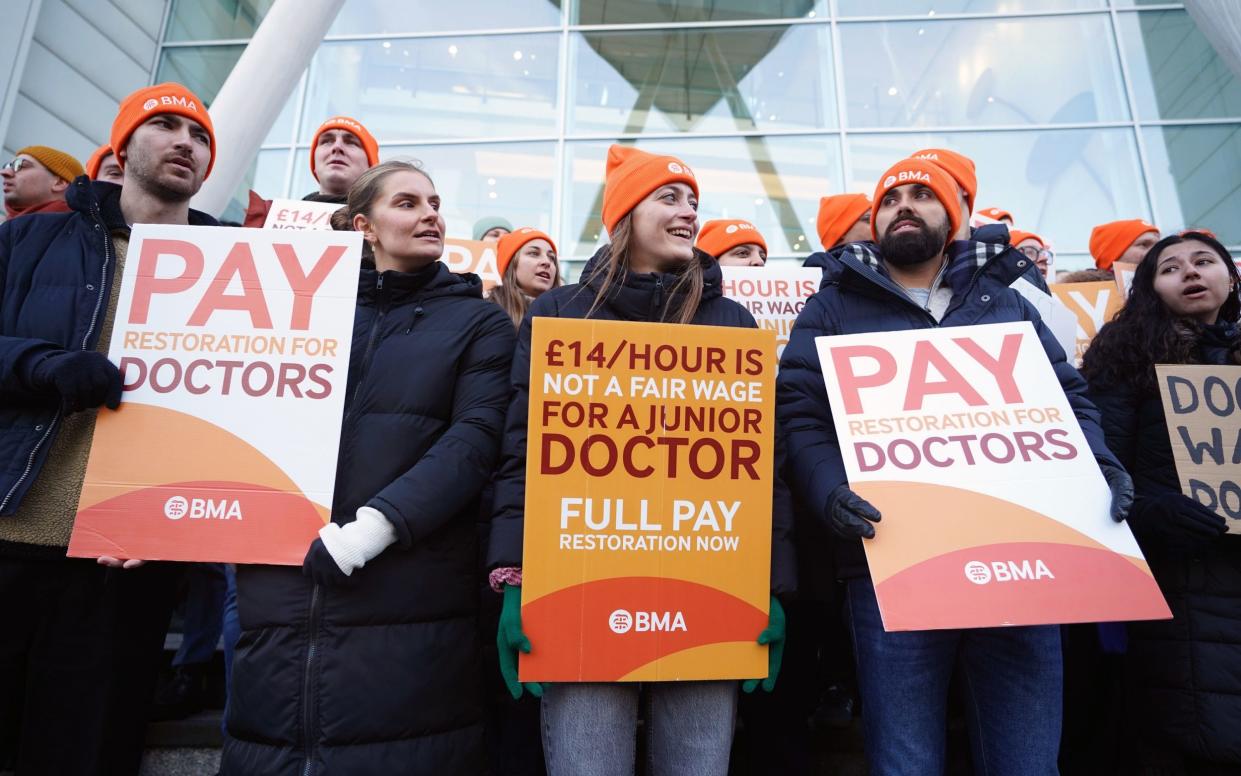Strikes add extra threat to patient safety in new year, NHS leaders warn

A triple threat of doctor strikes, NHS winter pressures and bank holidays pose a risk to patient safety in the new year, experts have warned.
Junior doctor strikes ended on Saturday at 7am and a six-day-long walkout is due to begin on Jan 3.
Matthew Taylor, chief executive of the members’ organisation NHS Confederation, said there is “real concern” for patient safety in the new year as the strikes come after bank holidays and at a perennially busy time of year for the health service.
The three-day strike in December was likely to have had an impact on the NHS backlog, he said, but the January dates are of much more concern.
He urged the British Medical Association (BMA) and the Government to consider renewing negotiations in a bid to avoid a six-day walkout and also voiced concern about a lack of national derogations to ensure there is adequate medical cover in the event of an emergency.
The six-day strike from Jan 3 would constitute the longest NHS walkout on record, at a time when the service is likely to be under the greatest strain.
There will be just four working days unaffected by strikes over the three-week Christmas and new year period.
‘Particular crunch point’
Mr Taylor told The Telegraph the Jan 3 date is a “particular crunch point” for the industrial action.
“While NHS leaders and their staff have worked hard to manage recent walk-outs and will continue to do so, the upcoming strikes in the new year will be a particular crunch point as they will be held during what are typically the most difficult weeks of the year.
“We hope they will be called off but if not, this is why it is so important that the BMA allows for there to be exemptions in place to support safer planned staffing levels across emergency and other key services.”
Mr Taylor told BBC Breakfast that the January strikes are of much more concern than the pre-Christmas strikes.
“I think six days of strike action following bank holidays at a time of enormous pressure, there are real issues around patient safety,” he said.
“We don’t have in place national derogations, which we have had for other strikes, so there will be an impact on the backlog but I also have real concerns about patient safety over these days.”
Official data from the Office for National Statistics show around one in 24 people in England, roughly 2.33 million people, are likely to be infected with Covid and the number is rising.
Spike in demand
Norovirus hospitalisations are also much higher this year than in previous winter seasons, adding more pressure to the NHS.
The strikes add to the normal new year spike in demand for healthcare services, which include high viral circulation, cold-weather illness, a rise in falls, and limited GP availability over the holiday period creating a backlog of appointments.
GPs told their patients to stay away until the new year as a result of the strikes in December, likely adding to the pressure on GPs during the doctors’ strike in January.
“We have got through these three days, as we have had to get through industrial action that has now been taking place in various ways for more than a year now,” Mr Taylor told the BBC Radio 4 Today programme.
“It was always our sense that these days [in December] would be easier to handle than the January days, partly because this is a quieter time for the health service but there has still been an impact.
“Leaders have talked about greater difficulty getting people discharged from hospital before Christmas.
“We rely every year on being able to discharge people and there have been particular issues around discharging people with mental health issues into the community, which can be really problematic as, very sadly, we get people with mental health needs stuck in A&E departments, which is a completely inappropriate place for them to be.
“So there has been an impact in these three days but it continues to be the case that it is really January that worries us.”
Risk of being harmed
NHS bosses warned earlier this month that cancer patients, expectant mothers and those requiring eye surgery risk being harmed by strikes in January.
Danny Mortimer, chief executive of NHS Employers, has written to the BMA, raising concerns about a “dramatic” increase in risks to patients.
Dr Rob Laurenson, BMA junior doctors committee co-chair, said: “The BMA is strongly committed to ensuring that patients are safe all year round, including during strike action.
“We recognise that patients are having to wait longer for care, but the reason for this is over a decade of chronic underinvestment in the NHS and its workforce by the Government.
“Junior doctors desperately want to care for our patients to the best of our ability, and our concerns about the impact of increasing staff shortages, deteriorating pay, and working conditions has forced us to take strike action.
“If Mr Taylor is as concerned about patient safety as we are, then he too should apply pressure on the Government, and encourage the health secretary to put forward the ‘credible’ offer she’s held back and avert the January strikes.”

